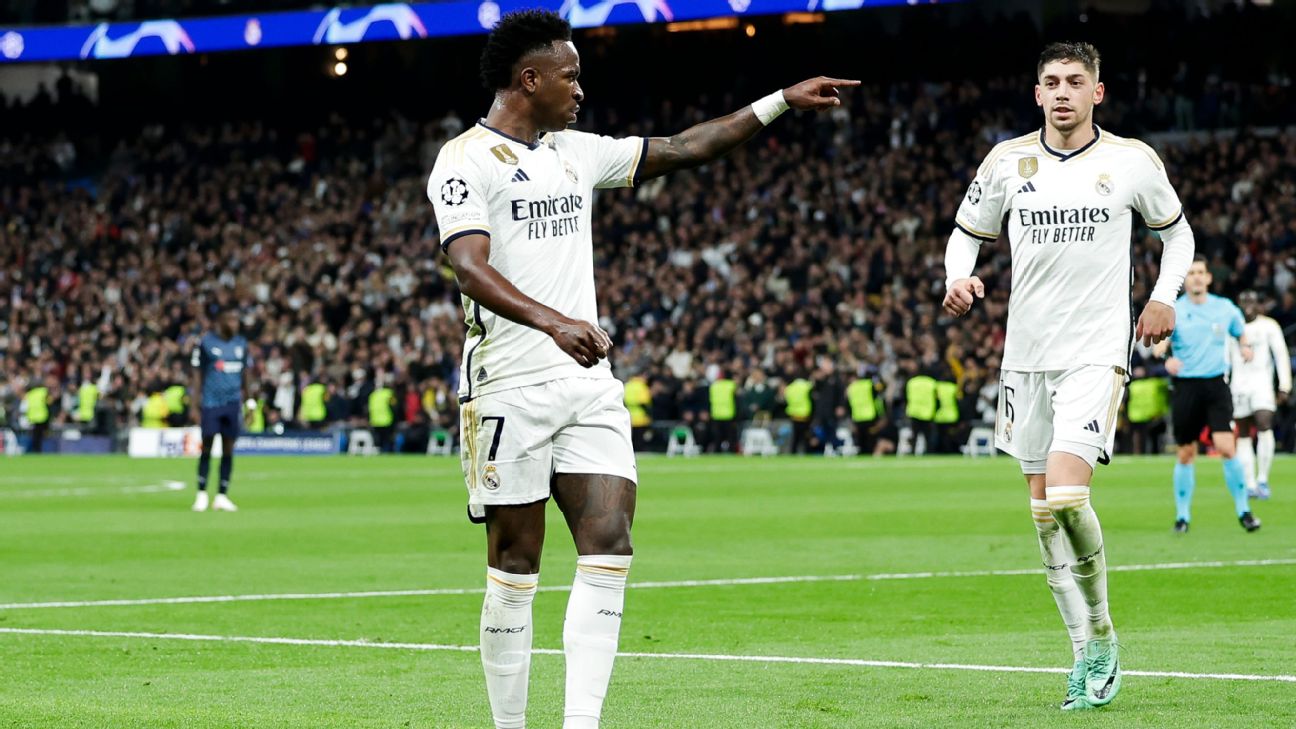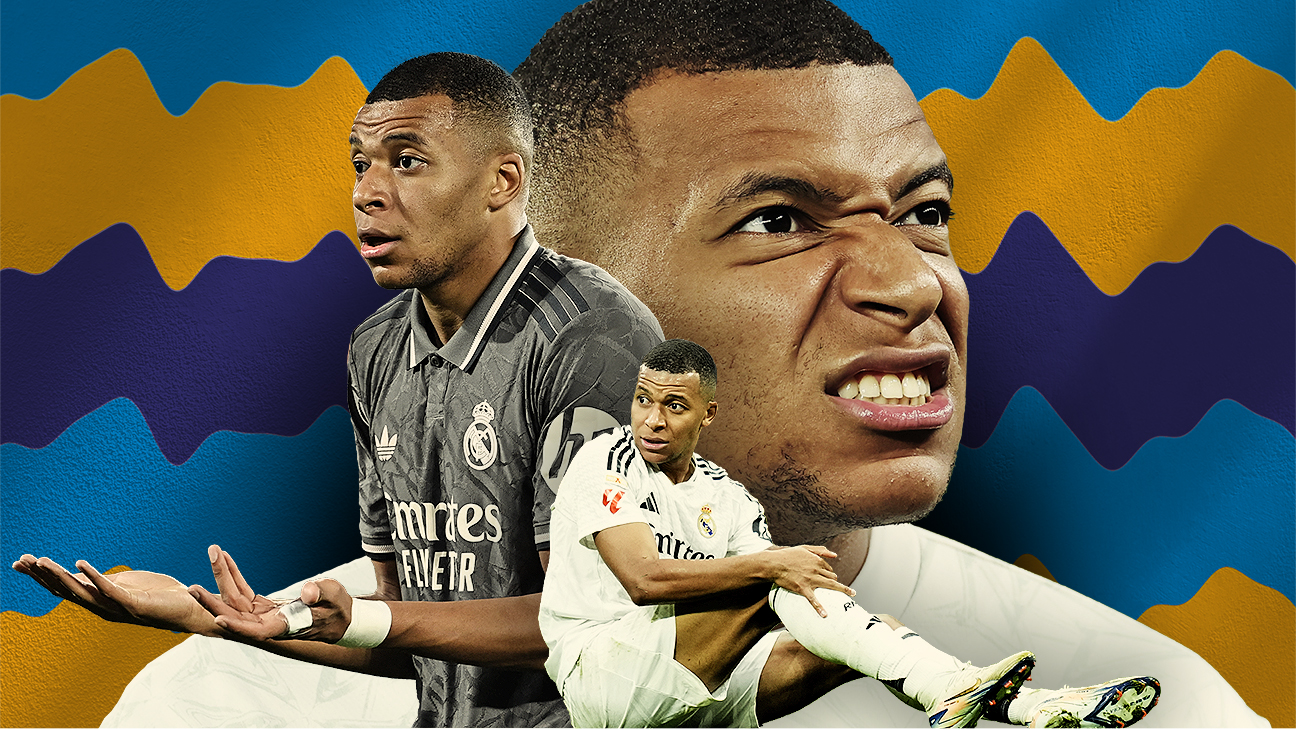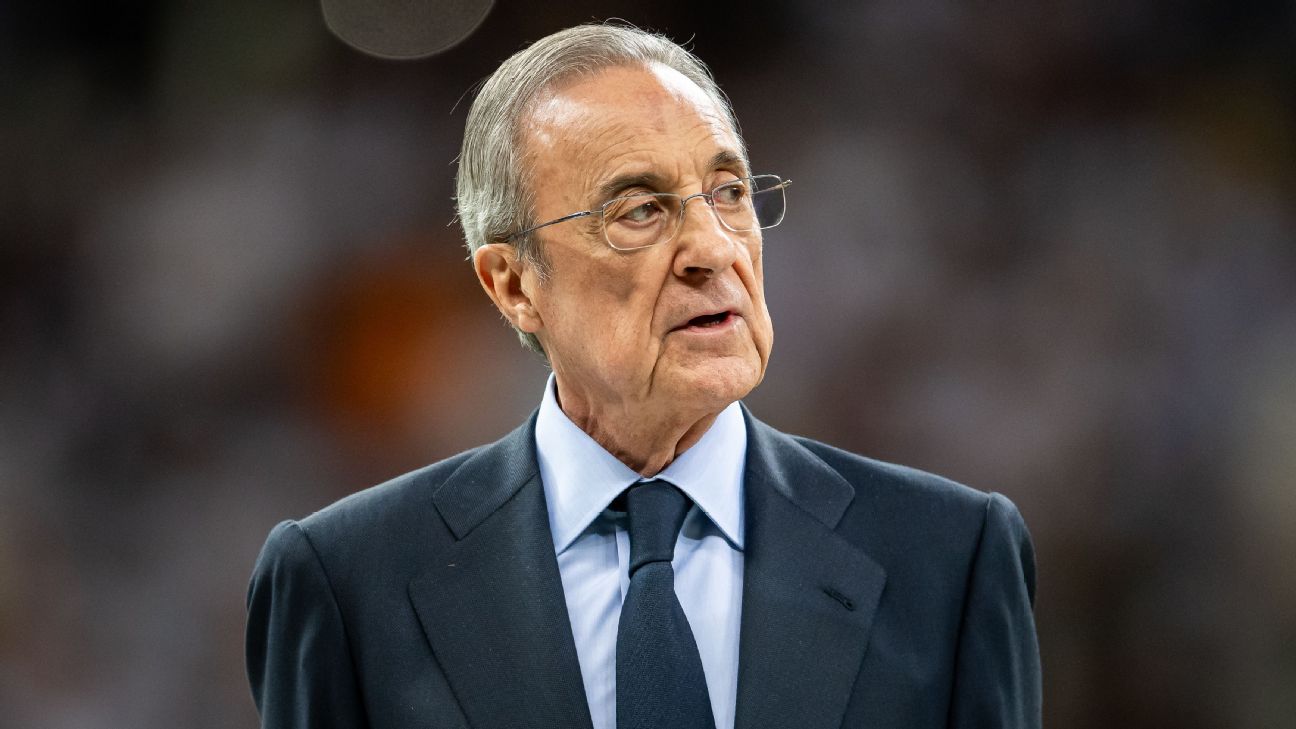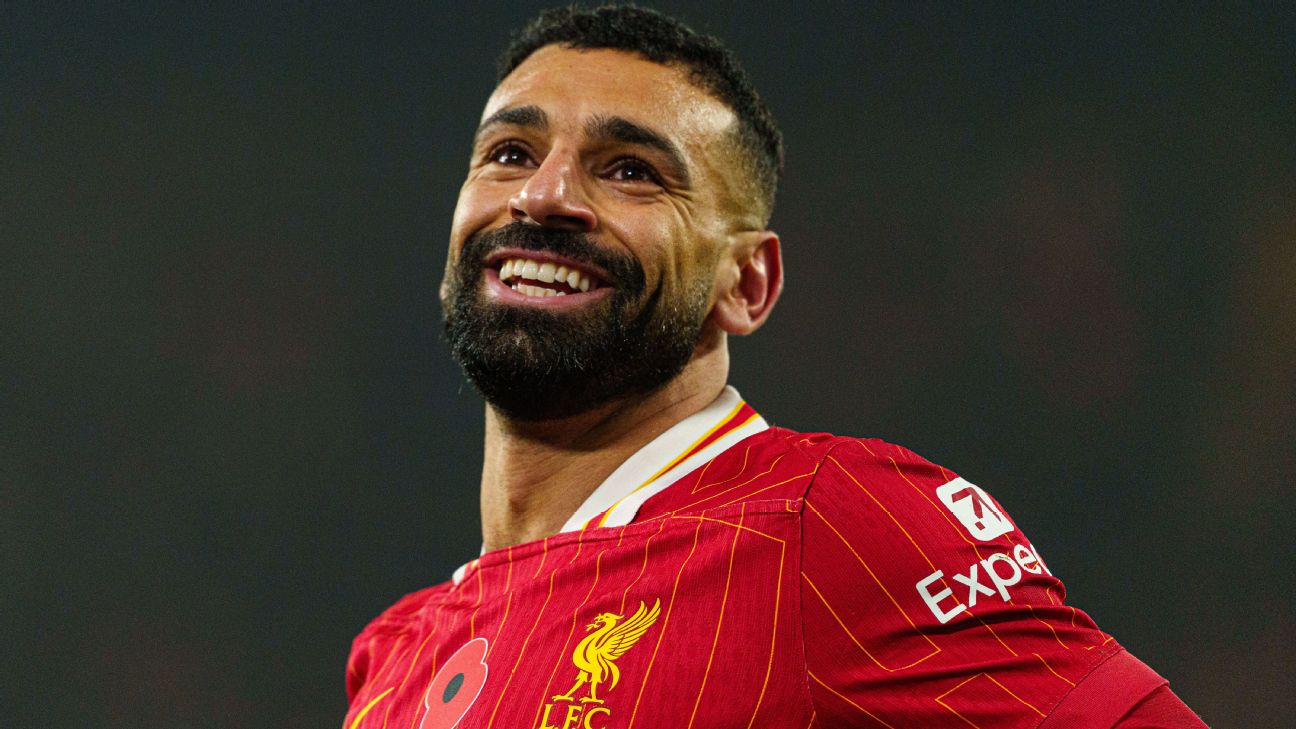Vinícius Júnior until 2027. Rodrygo Goes until 2028. Eduardo Camavinga and Federico Valverde until 2029. These players are Real Madrid’s future — together with their latest addition, Jude Bellingham — and in the past month, the club has announced new, long-term contracts for all of them.
On Oct. 31, Madrid said that Brazilian forward Vinícius had agreed a new deal. On Nov. 2, he was followed by his compatriot and strike partner, Rodrygo. On Nov. 7, the club confirmed an extension for midfielder Camavinga. Two days later, it was Valverde’s turn. The flurry of comunicado oficial announcements was both a statement of intent and an acknowledgment that this group of players form the foundation on which the next great Real Madrid team will be built.
– Stream on ESPN+: LaLiga, Bundesliga & more (U.S.)
As coach Carlo Ancelotti pointed out earlier this year, this is a transition that was underway long before this season. You could even say it started when Cristiano Ronaldo left in 2018, and it continued with the departures of Sergio Ramos and Raphaël Varane in 2021, Casemiro and Marcelo in 2022, and Karim Benzema last summer. Luka Modric and Toni Kroos remain but in supporting roles.
Vinícius is now 23. Rodrygo is 22. Camavinga is 21. Valverde is 25. These are players signed for what now look like reasonable fees, with the risky decision to spend €45 million each on transfer fees for teenagers Vinícius and Rodrygo in 2018 and 2019 fully vindicated. Camavinga was good business for the club with a €30m fee two years ago, and acquiring Valverde cost just €5m in fees back in 2016. All are now approaching their peak, and all are already proven at the highest level.
That proof came in Real Madrid’s Champions League-winning campaign in the 2021-22 season when the quartet played crucial parts. Valverde and Vinícius started the final against Liverpool, the Uruguayan providing the Brazilian with the assist for the game’s only goal. Rodrygo and Camavinga both played decisive roles off the bench in previous rounds.
The contracts for Vinícius and Rodrygo are not, in fact, new. While they were announced this month, sources told ESPN that both deals were agreed in the summer of 2022, and the players have been receiving their new, improved salaries since then. The club preferred to wait until now to make the renewals public. The players’ camps were not given a reason for the delay.
All four players faced challenges over the past year, both personal and professional. Vinícius has endured shameful racial abuse from opposition fans. Valverde had to deal with his partner’s complicated pregnancy. Less seriously, Rodrygo faced criticism when his goals dried up, and Camavinga has struggled to secure consistent space in the starting XI. Both Vinícius and Camavinga are now set to be unavailable until the end of January with injuries picked up on international duty — Vinícius with a hamstring problem, and Camavinga with a torn knee ligament.
All of them have benefited from the unflinching support of Ancelotti. But there have also been questions asked — by fans and in the media — about exactly what role each should play. Vinícius and Rodrygo must adapt to the tactical nuances demanded by Ancelotti’s switch to 4-4-2. Camavinga has delivered some of his best performances at left-back, a role he doesn’t enjoy. Valverde has been more effective than ever this season after lasting doubts about his best position.
ESPN takes a look at why Vinícius, Rodrygo, Camavinga, and Valverde deserve their new deals, and their importance to Real Madrid going forward.
Vinícius Júnior
Vinícius was Real Madrid’s most exciting player before Bellingham’s arrival, and he has been the standard bearer for this new generation. His breakout campaign was in 2021-22, with 17 goals in LaLiga and four in the Champions League. Those numbers dropped a little last season, with 10 goals in LaLiga and seven in the Champions League.
This season’s picture has been complicated by injury — he missed four weeks with a hamstring issue between late August and late September — and Ancelotti’s change of formation. Vinícius was so effective on the left-hand side of a front three that moving infield to form a front two was always going to present some teething problems.
Vinícius created 63 chances (54 key passes and nine assists) in 33 LaLiga appearances in 2022-23. He has created just nine chances (eight key passes and one assist) in 10 LaLiga games so far in 2023-24.
However, his form is getting better. His best performances this season have come in his past two games, against Braga in the Champions League — with a goal and assist — and scoring twice in Madrid’s 5-1 LaLiga win over Valencia. His partnership with Bellingham, who has been drifting left to combine with Vinícius, is promising, and despite a vast upgrade in his end product over the past two years, it still feels like there’s room for improvement. The recent injury, however, means it’ll be months until we see him back in the team.
The only nagging doubt over his long-term future involves how Madrid would try to fit Kylian Mbappé into the side if he were to eventually join next summer, as it would leave the team with arguably the two most dangerous left-sided forwards in world football. It wouldn’t make a great deal of sense in terms of squad planning, even if it’s a nice dilemma to have to solve.
Rodrygo Goes
Rodrygo went 95 days — and 11 games — without scoring a league goal this season between Real Madrid’s 2-0 win at Athletic Club on Aug. 12 and their 5-1 thrashing of Valencia on Nov. 11. That dry spell was interrupted only by two goals against Braga in the Champions League, on Oct. 24 and Nov. 8.
It’s not like he hasn’t been getting into goal-scoring positions. Rodrygo has had 42 shots in LaLiga this season, the most of any player, but has been worryingly inefficient: 12 of those shots were on target, 10 were off target, and 10 were blocked. His shot conversation rate — the percentage of shots that he scores from — is 7.1%. That compares to 37% for Bellingham, 32% for Atletico Madrid’s Antoine Griezmann, or 22.6% for Barcelona’s Robert Lewandowski.
But Rodrygo has shown enough quality in the past to deserve patience. Think back to his unforgettable two-goals-in-two-minutes cameo against Manchester City in the Champions League semifinals in May 2022. And he has been publicly backed by his manager.
“In my career, I’ve had forwards who scored in every game, and others who have moments where it’s more difficult,” Ancelotti said this month. “All you can do is support them. A player with Rodrygo or Vinicius’ characteristics, sooner or later they’ll score. It’s just a question of time.”
Like Vinícius, Rodrygo had his two best performances back-to-back against Braga and Valencia, with his two-goal, two-assist display against the latter a good representation of his electric best. “You have to be calm in front of goal,” he said afterward. “That’s what I was missing before … We’re both in our best form now. We’re the Rodry and Vini that the fans want to see again.”
Eduardo Camavinga
Nobody doubts Camavinga’s ability. Ever since joining from Rennes on deadline day in August 2021, he has become a cult hero among Real Madrid fans for his energetic, all-action style. The debate now, and sure to resume when he returns from injury in the new year, surrounds how best to successfully channel that energy into this Madrid team.
Ancelotti insists he’ll eventually settle at pivot, as a deep-lying midfielder. Others say that such a defensive-minded role inhibits his attacking instincts. One solution has been to play Camavinga alongside Kroos in a double pivot — as in the 5-1 win over Valencia — so that each player can bring out the best in the other while compensating for each other’s weaknesses.
Camavinga has made 32 tackles in LaLiga this season, with only seven players — among them, Barcelona’s Gavi — having made more. He also ranks highly for pass completion, at 90.5%, although that is below teammates Kroos (95%) and Aurélien Tchouaméni (93.1%), his rival for that central midfield spot.
One of Camavinga’s problems, for him at least, is how impressive he has been at left-back. At times, Ancelotti has appeared to trust him more than either of his nominal left-back options, Ferland Mendy and Fran García. Camavinga’s introduction at left-back in El Clasico on Oct. 28 changed the game. When he came on, Madrid trailed Barca 1-0. They ended up winning 2-1.
“People know that I don’t like to play [at left-back],” Camavinga said in September. “But it means I played more [last season]. I don’t like the position, but you have to do it for the team.”
Federico Valverde
Ale Moreno says Federico Valverde’s versatility makes him a key player for Real Madrid to lock down.
Valverde has quietly been having an outstanding season. He has been understandably eclipsed by Bellingham’s goal scoring, but that shouldn’t be allowed to overshadow just how important the Uruguay midfielder has been.
He’s near the top of the LaLiga charts for passes made in the final third (199, behind only Real Betis’ Isco and Barca’s Ilkay Gündogan), key passes (24, behind Isco, Gundogan, Iago Aspas and Ivan Rakitic) and ball carries — which is when a player moves the ball by dribbling — with 607, behind just five players in the league. In other words, Valverde has been critical to Madrid’s ability to move the ball upfield, and then do something useful with it.
Fede Valverde top 3 in the world right now
— Toni Kroos (@ToniKroos) October 16, 2022
As with Camavinga, an ongoing conundrum has been where to best deploy Valverde. As a youngster, he played as a central midfielder, but he first began to truly excel at Madrid when picked on the right of the front three, giving him the run of the entire wing. There, for a spell in the fall of 2022, he looked like one of the best around. “Fede Valverde top 3 in the world right now” Kroos tweeted, and he knows what he’s talking about.
Valverde’s role now is a little different, playing on the right of a midfield four, but it seems to suit him just as well. He just needs to start regularly scoring again, with one in LaLiga this season compared to seven in 2022-23 — six of which came in the first half of the season.
There are obvious questions about aspects of how this Real Madrid team fits together. There are doubts, too, about Ancelotti’s future at the Bernabeu, with his contract due to expire in June 2024 and links to the Brazil national team job that won’t go away.
But those uncertainties shouldn’t obscure the good news: that Madrid have tied down the core of their newly rebuilt team for the long term, with players who were signed as teenagers, have grown up together, understand the club, its values, and demands, and have already proved they have what it takes to win major trophies. And that is a triumph of smart management which should be celebrated.



